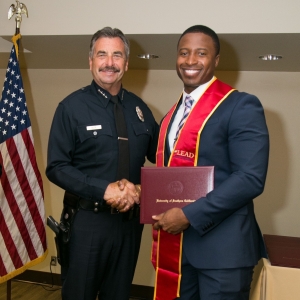Meet the LEAD Graduating Class: Louis Lavender
June 15, 2018- Students
Last year, USC launched a partnership with the Los Angeles Police Department to create the Law Enforcement Advanced Development (LEAD) program. LEAD is an online and classroom-based training program in which experts from the USC Suzanne Dworak-Peck School of Social Work and the USC Sol Price School of Public Policy come together to train officers, teaching evidence-based techniques to reduce the need for force and help officers develop communication skills for effective de-escalation.
The LEAD program culminates with the presentation of officers’ capstone projects, which are meant to present implementable solutions to specific community problems such as homelessness, domestic violence, mental illness and human trafficking. To celebrate the June 8 commencement of the inaugural LEAD class, we’re highlighting a few outstanding participants and their capstone projects.
Louis Lavender isn’t just an LAPD sergeant and detective—he’s also a professor at Los Angeles Southwest College(LASC), where he teaches a class in administration of justice. Lavender is applying the skills he’s gained in the LEAD program to challenge his students’ misconceptions of law enforcement and create new outreach initiatives focused on recruiting more young people of color to serve their communities as police officers.
USC Suzanne Dworak-Peck School of Social Work: Tell us about your professional background and why you decided to apply for the LEAD program.
Louis Lavender: I’ve been with the LAPD for about 11 years, and I currently have dual status as detective and sergeant, working primarily in the Venice Beach area. I also teach courses in administration of justice at LASC.
I heard about LEAD through our department’s website and was eager to take advantage of the opportunity to gain new skills from experts at USC that will help us solve community issues.
Considering the tense political climate and widespread media discourse about police in our country today, it’s important to broach sensitive social issues. I knew the LEAD program would give me a set of tools to understand and interact with these issues in a deeper way. I also recognized that in my position, I would have the opportunity to spread knowledge gained through LEAD across the LAPD to encourage broader change.
USC: What is the focus of your capstone project, and how did your experience as a police officer and educator influence the direction of your project?
LL: I’d been considering launching an initiative for years to address the lack of racial and ethnic diversity within the LAPD. Our classes at the police academy and our youth programs generally include a very small percentage of African-American participants. This imbalance is exacerbated by a general distrust of the police within minority communities, which I witnessed in the classroom at Southwest College.
From receiving traffic citations to seeing friends get arrested for seemingly minor infractions, most of my students don’t have positive experiences to report about their interactions with law enforcement. The majority of the student body is African American and Hispanic, so if I want to foster higher diversity within the LAPD, I need to offer these students a new perspective.
The overall mission of my project is to build greater trust within the community and mitigate the “us versus them” mentality that many people hold regarding the police. One way I’d like to achieve this goal is by introducing an initiative to hire officers who better reflect the demographics of the populations that they serve. By introducing this initiative within the police department as well as at the college, I’ll have an ideal opportunity to bridge the gap between the LAPD and the community we serve.
USC: How will your proposed program build connections between the LAPD and minority communities?
LL: First of all, a foundational element of my project is the MEET model, which stands for “Mentor, Expose, Educate and Train.” I want to encourage officers to “meet,” or see eye-to-eye with, community members.
For my capstone project, I’m essentially proposing new initiatives to create meaningful educational opportunities for students of color to connect with police officers in a non-threatening environment. Some of these may include bringing officers into the classroom as guest speakers or giving students a chance to use our force option simulator, an interactive program that simulates scenarios an officer might encounter in the field which may require them to make snap-second decisions about the use of force.
For the time being, I’m working on establishing a partnership between the LAPD’s and LASC’s recruiting programs, encouraging young students—especially African Americans—to consider the benefits of higher education or enrolling in the police academy.
USC: What do you consider to be the most valuable aspects of the LEAD program?
LL: While gaining new knowledge and skills over the course of the program was valuable, the most vital part of my LEAD experience was working on the capstone project because it forced me to develop a tangible plan to achieve the changes I want to see in our community. Since presenting my capstone project, I’ve been approached by a number of captains across divisions in the police department asking how they can assist me in getting this program off the ground.
Overall, I enjoyed the learning experience with LEAD so much that I’m considering applying to a PhD program at USC!
To reference the work of our faculty online, we ask that you directly quote their work where possible and attribute it to "FACULTY NAME, a professor in the USC Suzanne Dworak-Peck School of Social Work” (LINK: https://dworakpeck.usc.edu)
